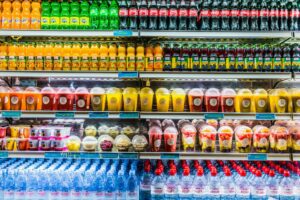Packaging News has published an article whereby UKRI’s Paul Davidson reflects on the Environmental Packaging Summit 2021, as well as examining plastic packaging’s role in a greener future.
Dr. Paul Davidson, Challenge Director for the Smart Sustainable Plastic Packaging Challenge, outlines some of the drivers and barriers to developing a more sustainable packaging supply chain in his latest blog on the Packaging News website.
You can read this in full here and view an excerpt below:
For plastic packaging, the transition towards a more sustainable footing requires action on a number of fronts. It means reducing plastic demand by developing and mainstreaming opportunities for reusable and refillable packaging and cutting down on unnecessary single use plastic formats that are challenging to capture for recycling or escape easily into the environment. It means supporting greater plastics recycling through better packaging design, better management of plastic waste streams and understanding of consumer behaviour, and more research and investment in different recycling technologies.
Recycling is not the panacea, but it is part of the answer. More work is also needed to establish what role bio-based, biodegradable and compostable plastics could play in the future.
The Smart Sustainable Plastic Packaging (SSPP) Challenge is working at the heart of this complex problem. A £60 million, 5-year programme, it is the largest ever UK government investment in sustainable plastics research and innovation. Bringing together industry and academia and supporting the delivery of the UK Plastics Pact, its aim is to establish the UK as a leading innovator in smart and sustainable plastic packaging for consumer products, delivering cleaner growth across the supply chain and a dramatic reduction in plastic waste entering the environment by 2025. We are doing this by:
- driving research and innovation to develop more sustainable plastic packaging materials and designs, enable new recycling processes and infrastructure, and support reductions in packaging by tackling barriers to reuse and refill supply models
- encouraging collaboration and innovation in integrated circular supply chains, addressing key barriers to change and using insights into consumer behaviour to reduce the environmental impacts of plastic packaging.
To date, the Challenge has invested nearly £29 million including infrastructure funding for four cutting-edge recycling plants and research funding for projects designed to reduce plastic packaging, increase reusable packaging, and develop circular economy models and solutions for plastic packaging. Feasibility studies that could lead to future larger scale solutions to plastics packaging have also been supported, including research into future options for compostable plastics and circular business models for food-to-go packaging.
Early next year, we will also be announcing the results of two further major funding competitions, both for infrastructure and business-led R&D projects. We will also be teaming up with partners like KTN and key stakeholders in the plastics packaging supply chain to roll out a major knowledge-sharing programme and ensure that the learning from the various research projects can be accessed and built on.
There could be no better time for this initiative. ahead of COP26 UNEP published a report (From Pollution to Solution: a global assessment of marine litter and plastic pollution) which highlights the magnitude of the challenge at a global level, with plastic currently accounting for 85% of marine litter and plastic pollution entering the marine environment likely to triple by 2040, releasing an additional 23-37 million tonnes/year of plastic waste into the ocean.




